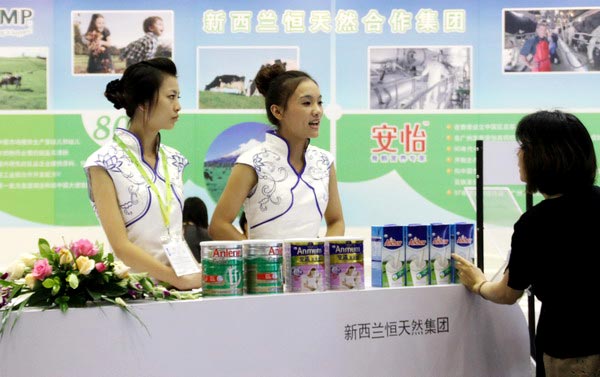 Russian navy ships make peace visit to Cuba
Russian navy ships make peace visit to Cuba
 Shanghai Tower topped off with final beam
Shanghai Tower topped off with final beam
 Children model contest held in N China
Children model contest held in N China
 Death toll rises to 29 in rain-related accidents across Pakistan
Death toll rises to 29 in rain-related accidents across Pakistan
 Gales brought by tropical storm Jebi hit coastal areas of Guangxi
Gales brought by tropical storm Jebi hit coastal areas of Guangxi
 Nutrica recalls Karicare infant formula in New Zealand
Nutrica recalls Karicare infant formula in New Zealand
 Li Na attends official draw ceremony for women's singles of Rogers Cup
Li Na attends official draw ceremony for women's singles of Rogers Cup
 Child labor still remains rampant in war-hit Afghanistan
Child labor still remains rampant in war-hit Afghanistan
 3rd Tangka Art Exposition opens in Lhasa
3rd Tangka Art Exposition opens in Lhasa
 |
| Fonterra Cooperative Group Ltd promotes its milk powder products at a dairy expo in Beijing. The New Zealand dairy giant said its products are safe after media reported that trace chemical residues were detected in its products. (Photo source: China Daily) |
China's importers on Sunday began to recall and seal products produced by New Zealand dairy giant Fonterra due to safety concerns over its allegedly contaminated whey protein that could cause botulism.
The recall began after the General Administration of Quality Supervision, Inspection and Quarantine (AQSIQ) announced a list of four domestic companies that have imported whey products that may be contaminated with clostridium botulinum.
Fonterra said Friday that some of its whey protein produced in May 2012 was found to be contaminated with the toxic bacteria.
The four importers are China's biggest food and beverage firms Hangzhou Wahaha Health Food Co., Ltd., Hangzhou Wahaha Import & Export Co., Ltd., Shanghai Tangjiu (Group) Co., Ltd. and Shanghai-based Dumex Baby Food Co., Ltd., according to AQSIQ.
Baby formula maker Dumex said it is sealing imported Fonterra products and recalling two of its branded formula products that were made with the whey protein.
Dumex has produced 726.552 tonnes of its own milk powder products with the potentially tainted materials and 420.188 tonnes have already been sold in China's domestic market, the watchdog authorities said.
Among the seven batches weighing 208.55 tonnes of problematic products which Dumex purchased from Fonterra, 105.45 tonnes have been used for producing baby formula products,said Shanghai's municipal quality inspection authorities late Sunday.
Quality inspectors in Shanghai have demanded Dumex recall the relevant products and track down its sales records.
On Sunday afternoon, relevant products of Dumex were removed from shelves in many supermarkets in Shanghai.
Zhu Yi, associate professor in food science and nutrition at China Agricultural University, said clostridium botulinum can grow in canned food which is inappropriately processed, packaged or stored, thus posing a big threat to babies aged below one year.
Clostridium botulinum bacteria produce toxins and can cause botulism, a rare but potentially life-threatening illness. Symptoms of botulism include nausea, vomiting, drooping eyelids, difficult swallowing and paralysis.
The Wahaha Group, which owns two of the companies in question, has initiated recalls for affected products despite finding no signs of contamination in them, said the group's chairman Zong Qinghou.
The company imported from Fonterra about 14.5 tonnes of whey protein produced in May 2012 to process its dairy products, including its popular Nutri-Express drink, according to Zong.
The products hit shelves in October 2012 and the company is working to recall any unsold items.
Shanghai Tangjiu, a Chinese agent for Fonterra products, said in a statement that it had imported 4.8 tonnes of affected whey protein before selling them to the Shanghai branch of Coca-Cola.
Coca-Cola confirmed the news in a statement, which said 4.77 tonnes of the ingredient had been sealed. The remaining whey protein was used to produce milk beverages that are now being recalled.
The latest scare dealt a fresh blow to sensitive Chinese consumers as an increasing number of them have come to worship foreign brands after trust in domestic producers has been hammered by a 2008 milk scandal, in which six infants died for consuming baby milk tainted by melamine.
In the first half of this year, China's milk powder imports from New Zealand jumped 34.3 percent year on year to reach 371,000 tonnes, accounting for 83.3 percent of its total imports, Chinese customs data showed.
AQSIQ on Sunday also issued a consumer warning for three batches of Karicare-brand dairy products produced by New Zealand company Nutricia.
Nutricia has initiated preemptive recalls over concerns that some materials supplied by Fonterra for the production of Karicare-brand products may be contaminated.
The affected Karicare products are not officially imported to China, but may have entered the country through other channels, AQSIQ said.
 Tough training of PLA special forces
Tough training of PLA special forces  Pakistan's rain-triggered accidents claim 29 lives: media
Pakistan's rain-triggered accidents claim 29 lives: media Confession of a parkour lover
Confession of a parkour lover Yi people celebrate torch festival with songs and dances
Yi people celebrate torch festival with songs and dances  Two gold-backed ETFs launched in Shanghai
Two gold-backed ETFs launched in Shanghai Sun Yang wins 3rd gold of World Championship
Sun Yang wins 3rd gold of World ChampionshipDay|Week|Month